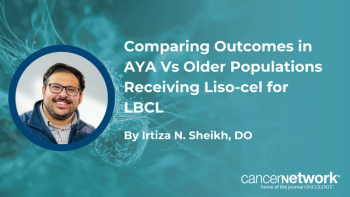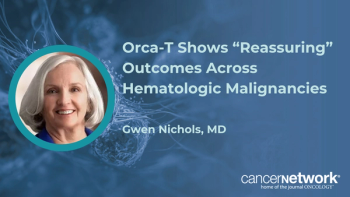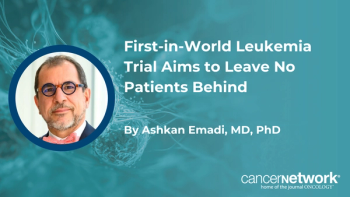
Cell of Origin, MYC/BCL2 Status Did Not Predict Outcomes in Early-Stage DLBCL
Cell of origin and dual expressor/double-hit status may not confer prognosis as originally suspected.
In contrast to advanced diffuse large B-cell lymphoma (DLBCL), cell of origin (COO) and duel-expressor/double-hit (DE/DH) status may not confer an inferior prognosis among patients with early-stage disease treated with R-CHOP-like therapy, according to a new
“Among DLBCL patients, COO has been shown to influence overall prognosis, with the activated B-cell like (or non-germinal center B-cell [GCB] like) group experiencing inferior outcomes when treated with standard R-CHOP (rituximab, cyclophosphamide, doxorubicin, vincristine, and prednisone) chemoimmunotherapy in some studies,” Allison Barraclough, of Sir Charles Gairdner Hospital, Perth, Audtralia, and colleagues wrote. “Tumors with morphologic features of DLBCL bearing rearrangements in MYC and BCL2 and/or BCL6 represent a unique biologic entity that is characterized by aggressive clinical behavior, tendency toward extranodal and central nervous system involvement, and poor responses to R-CHOP chemoimmunotherapy.”
In this study, Barraclough and colleagues hypothesized that among patients with stage I/II DLBCL treated with R-CHOP-like regimens, these factors may not have an effect on prognosis. To test that they conducted a retrospective study looked at COO and DE/DH status in 211 patients with early-stage disease treated with R-CHOP-like regimens with or without radiotherapy.
The median follow-up was 4 years with an estimated 4-year progression-free survival of 85% and overall survival of 88%.
A multivariable analysis showed no association between non-GCB COO, DE status, DH status, or immunohistochemistry BCL-2 expression on progression-free or overall survival. The only factor that remained significant for its effect on survival was tumor size greater than 7.5 cm for progression-free survival (hazard ratio, 5.10; 95% CI, 1.18-22.12; P=.03).
“Although our relatively modest cohort size limits our ability to draw definitive conclusions, particularly for the DH patients (n=7), these data suggest that intensified chemoimmunotherapy regimens (such as daEPOCH-R) may not be required for stage I/II HGBL-DH patients,” the researchers wrote.
Specifically, these data are important to consider given modifications to frontline therapy that are being researched to improve outcomes in high-risk subgroups of patients with DLBCL, the researchers wrote. Some examples include the use of lenalidomide in addition to R-CHOP to overcome the adverse impact of ABC phenotype, intensified regimens to overcome the negative impact of DE status, or the addition of venetoclax and lenalidomide to R-CHOP to improve outcomes in DH lymphoma.
“Even if these approaches prove beneficial in high-risk molecular subgroups of DLBCL, such as non-GCB COO, DE, or DH, the additional cost and toxicity of these regimens may not be justified in patients with stage I/II disease,” they wrote.
Newsletter
Stay up to date on recent advances in the multidisciplinary approach to cancer.
Related Content













































